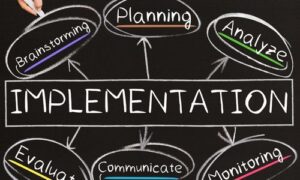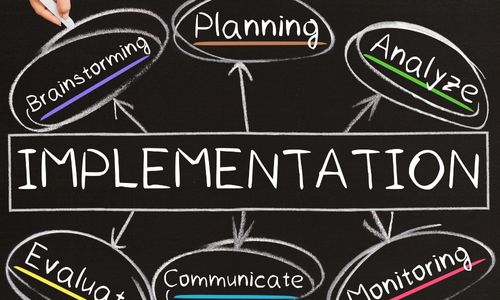
This is part of a blog series on our problem-solving paradigm RISE. Stay tuned for the final part of the series.
Executive Function skills are cognitive processes that help us plan and achieve goals. Problem solving is a skillset that allows people to overcome obstacles that are getting in the way of our success in achieving goals. Through this blog series, we hope to help you better understand the breakdown of the problem solving process, tapping into executive function skill development at the same time. We will be discussing the third step of problem solving now: Strategy Implementation. There are two main points we will explore:
Why knowing what to do is very different from actually doing it.
When discussing problem solving, New Frontiers breaks down Identifying Strategies and Strategy Implementation because they rely on different cognitive functions. Let’s use the example of an individual who identifies their messy room as problematic. They realize that when their room is messy, they are less motivated to wake up in the morning and that it impacts how efficient they are. Their mornings are always hectic and it is causing problems with their family. This individual comes to the conclusion that they want to allocate thirty minutes every day after dinner to cleaning. Great, right?! The first night comes, and everything goes according to plan, problem solved! The second night comes around though, and things aren’t that messy. This individual convinces themselves that they can skip the night and relax. The third night comes around and the family decides to go out to dinner. Since they didn’t get home until late, another day has gone by with another excuse as to why the strategy couldn’t be implemented.
This long-winded example helps show a few reasons why implementing strategies can be so problematic, even when you know what to do. There are three focus areas to learn about:
Adapting of Strategies
In this case, the individual could have been struggling with adapting the strategy. It sounded great when they came up with the strategy, but, in practice, it may not be feasible. A good question to ask would have been, “Is after dinner the best time?” This is where the last step to problem solving, Evaluating Effectiveness, becomes so important.
Creation of New Habits
Sometimes there aren’t any issues with the actual strategy, but the difficulties are arising from developing a new habit. With any new habit, the beginning is always the hardest. Our brains have to put in a lot of effort to do new things, but, as those strategies are used more often and frequently, they begin to become second nature. Think about going to a new school or job, your morning routines change and you have to put in a lot of effort at first. As you get more acclimated and go through those new routines, it becomes easier and easier to do. When implementing new strategies, know that it becomes easier as time goes on. Don’t give up right away! You can try and create some external accountability (tell others about your strategies!) or create a reward system for yourself for when you successfully follow through with implementing strategies to keep your motivation up.
What executive functioning skills are needed to Implement Strategies?
Inhibitory Controls
Inhibitory controls help us focus on what we identify as important and relevant information. When changing our behaviors and implementing new strategies, there is a desire to do what we know and what we are comfortable with. When implementing strategies, the goal isn’t always tangible and immediately in front of you. During this time, it is important to have reminders as to why we are implementing these strategies in the first place. Connecting the end result to our actions can help limit distractions that get in the way.
Initiation
Initiation is the ability to get started on a task. Think of working out, half the battle can be getting to the gym, but once you are there, it is much easier to continue. If you are struggling to start implementing new strategies, break down what getting started looks like. What are all the steps to get started and help set up reminders so that you remember to get started in the first place. The more you practice the strategy, the easier it will become to continue using it. Initiation struggles tend to fade with more practice. This is why it is so important not to give up after a few tries.
Time Management and Prioritization
One of the most common obstacles to implementing strategies is a lack of time and low prioritization. With new strategies, we often hear: “I’ll do it next time.” This often is because there are other pressing matters that need attention. New strategies take longer to implement because they are new! When developing strategies in the prior problem solving step, we need to really remind ourselves of the reason why we are trying a new strategy in the first place. Give yourself some wiggle room when setting time aside to try new strategies. That way, you try and prevent the excuse making as to why other things are more important to get done.
Goal-Directed Persistence
We often don’t see change right away and many new strategies do go through a period of adaptation until we really see the benefits of them. The delayed result combined with the increased difficulty of doing new things can make it hard to continue implementing a strategy. One trick is to communicate to others the strategy you are trying to implement. This helps outsource some accountability to help you persist. Also, take time to remind yourself of why you are using this strategy in the first place.
–
Now that we’ve implemented these new strategies, the problem is solved, right?!? Not necessarily…The last part of problem-solving is to evaluate how effective these strategies are in solving the problem at hand. Great job implementing these strategies, but should we continue to use them? Stay tuned for the next in our blog series; we will move on to Evaluating Effectiveness.





